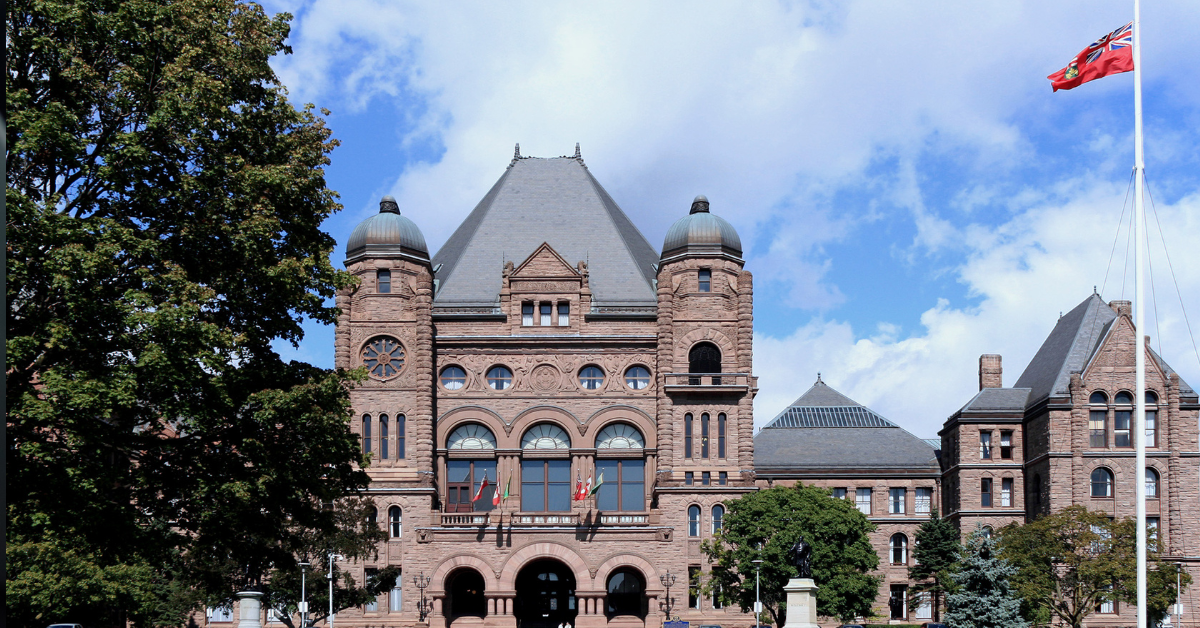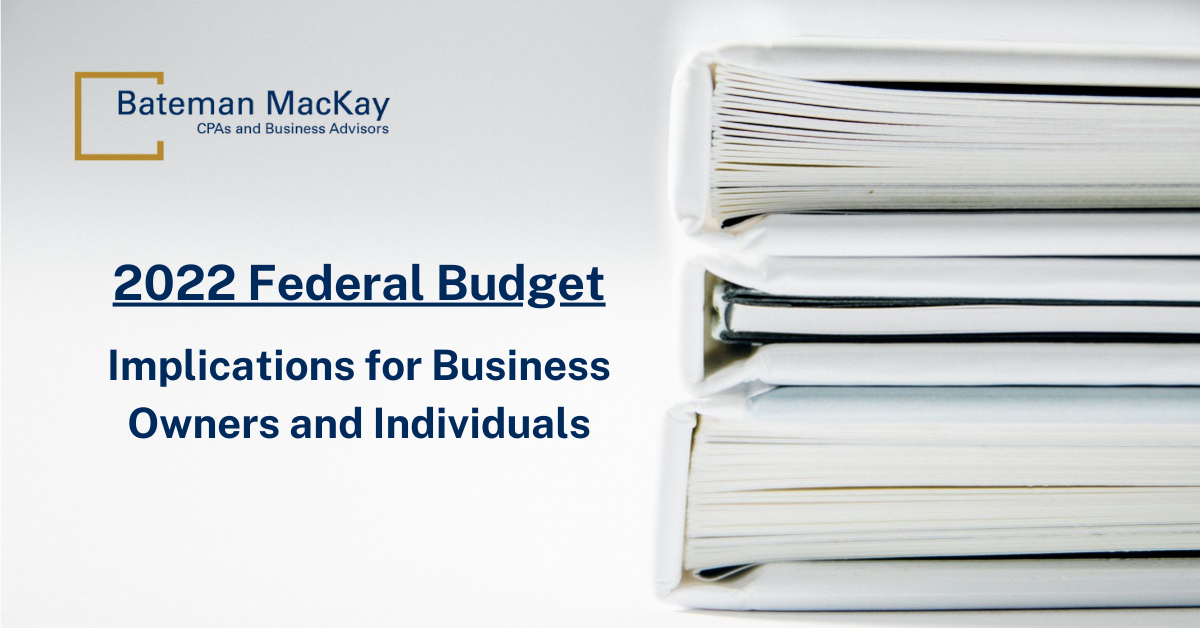| Our 2022 Federal Budget highlights below are the items most relevant to business owners. Click here to download our more comprehensive Federal Budget 2022 commentary. |
| On April 7, 2022, the Deputy Prime Minister and Finance Minister, the Honourable Chrystia Freeland, presented the 2022 Federal Budget (“the Budget”). Recognizing an end to pandemic restrictions and support, the budget aims to address inflation, housing affordability, the green economy and other issues. The recently announced Liberal Party and New Democratic Party coalition almost assures passage of the Budget. The Budget contained no changes to personal or corporate tax rates, nor the inclusion rate on taxable capital gains which many tax prognosticators felt was forthcoming. The Federal deficit is expected to be $113.8 billion for 2021-22 (reduced from $327.7 billion for 2020-21). |
Highlights include:
- Several proposals targeting housing affordability including a tax-deductible and Tax-Free First Home Savings Account in addition to enhancing existing home-related tax credits.
- Increased access to the small business deduction for corporations with taxable capital between $10 million and $50 million.
- Anti-avoidance measures targeting private corporations attempting to avoid the refundable tax regime for investment income.
- An intention to amend the Bill C-208 to restrict these transactions to genuine intergenerational business successions.
Business Measures
Small Business Deduction
Budget 2022 proposes to reduce the small business deduction limit by $1 for every $80 of taxable capital in excess of $10 million, such that the limit will be more gradually reduced, and only eliminated where taxable capital equals or exceeds $50 million. Previously, the small business deduction limit would be reduced when a corporation’s taxable capital was between $10 million and $15 million and eliminated beyond $15 million. This measure is proposed to apply for corporate taxation years beginning on or after April 7, 2022.
No changes are proposed to the parallel reduction to the business limit where adjusted aggregate investment income exceeds $50,000.
Anti-Avoidance Measures – Corporate Investment Income
Budget 2022 proposes that private corporations which are not Canadian Controlled Private Corporations (“CCPCs”), but are factually controlled by one or more Canadian persons, be subject to the same investment income rules as a CCPC. An anti-avoidance rule will also apply this treatment to any corporation falling outside the technical rules, where it is reasonable to consider that one or more transactions were undertaken to avoid these rules. This measure will generally apply to taxation years that end on or after April 7, 2022, with possible deferral where an arm’s length sale pursuant to a written purchase and sale agreement was entered into prior to that date.
Intergenerational Business Transfers
A complex anti-avoidance rule prevents the sale of shares of closely-held corporations by individual shareholders to related corporations whereby capital gains eligible for the lifetime capital gains exemption (LCGE) are realized.
Budget 2022 reiterates the government’s intention to amend the legislation to restrict these transactions to genuine intergenerational business transfers, while continuing to facilitate legitimate business successions. It announces a consultation by the Department of Finance, with specific mention of the agriculture sector, to close on June 17, 2022. The government indicated that amending legislation would be included in a bill to be tabled in the fall after the conclusion of the consultation process.
Business Investment Initiatives
Budget 2022 proposes to create the Employee Ownership Trust, a new type of trust to support employee ownership. The government will engage with stakeholders to develop rules for these trusts.
Encouraging Innovation
Budget 2022 announces a review of the Scientific Research and Experimental Development (SR&ED) program, to assess its effectiveness in encouraging R&D that benefits Canada, and to explore opportunities to modernize and simplify the program. As part of this review, the government will also consider whether the tax system can encourage the development and retention of intellectual property, including seeking views on the suitability of adopting a patent box regime.
Financial Sector
A one-time 15% tax on bank and life insurance companies, based on taxable income in excess of $1 billion for taxation years ended in 2021, would be imposed for the 2022 taxation year and payable over five years. For subsequent years, a 1.5% additional tax would apply to income of such corporate groups in excess of $100 million.
Combatting Aggressive Tax Planning
Budget 2022 proposes to provide $1.2 billion over five years for CRA to expand audits of larger entities and non-residents engaged in aggressive tax planning; increase both the investigation and prosecution of those engaged in criminal tax evasion; and to expand its educational outreach.
Housing Measures
Tax-Free First Home Savings Account (FHSA)
Budget 2022 proposes to create the tax-free FHSA to help first-time home buyers save up to $40,000 for their first home. Contributions to an FHSA would be deductible (like an RRSP), and income earned in an FHSA and qualifying withdrawals from an FHSA made to purchase a first home would be non-taxable (like a TFSA).
The lifetime limit on FHSA contributions would be $40,000, subject to an annual contribution limit of $8,000. Unused annual contribution room would not be carried forward. Individuals would also be allowed to transfer funds from an RRSP to an FHSA tax-free, subject to the $40,000 lifetime and $8,000 annual contribution limits.
The government would work with financial institutions to allow individuals to open an FHSA and start contributing in 2023.
Home Buyers’ Tax Credit
Budget 2022 proposes to double the Home Buyers’ Tax Credit amount, such that tax relief of up to $1,500 can be accessed by eligible home buyers. This measure would apply to acquisitions of a qualifying home made on or after January 1, 2022.
Home Accessibility Tax Credit
Budget 2022 proposes to double the annual expense limit to $20,000, such that the maximum non-refundable tax credit would be $3,000. This measure would apply to expenses incurred in the 2022 and subsequent taxation years.
Multigenerational Home Renovation Tax Credit
Budget 2022 proposes a new refundable tax credit to support constructing a secondary suite for an eligible person to live with a qualifying relation. An eligible person would be a senior (65+ years of age at the end of the tax year when the renovation was completed) or an adult (18+ years of age) eligible for the disability tax credit. This tax credit would provide tax relief of 15% on up to $50,000 of eligible expenditures, providing a maximum benefit of $7,500.
This measure would apply for the 2023 and subsequent taxation years, in respect of work performed and paid for and/or goods acquired on or after January 1, 2023.
Residential Property Flipping Rule
The government is concerned that taxpayers are inappropriately reporting gains on the disposition of real estate acquired for resale at a profit. In these cases, the profit is fully taxable as business income (100% taxed), and not a capital gain (50% taxed, and potentially eligible for the principal residence exemption).
Budget 2022 proposes to introduce a new rule that all gains arising from dispositions of residential property (including a rental property) that were owned for a period of less than 12 months, would be deemed to be business income. While this measure was reflected as a “personal income tax measure,” it is unclear whether the deeming rule will also apply to corporations and other taxpayers. This measure would apply in respect of residential properties sold on or after January 1, 2023. The government indicates that there will be stakeholder consultations during the drafting of this legislation.
Personal Measures
Dental Care for Canadians
Budget 2022 also proposes a number of measures for individuals for which few details were provided, including the following:
Dental care would be funded, starting for children under age 12 in 2022, expanding to children under age 18, seniors and disabled individuals in 2023, with full implementation by 2025. Full coverage would be provided for families with under $70,000 of annual income and no coverage would be provided for families with income of $90,000 or more.
Labour Mobility Deduction for Tradespeople
Budget 2022 proposes a deduction of up to $4,000/year to recognize certain travel and relocation expenses of workers in the construction industry.
Medical Expense Tax Credit (METC) for Surrogacy and Other Expenses
Budget 2022 proposes to expand access to the METC in cases where an individual relies on a surrogate or a donor to become a parent. Medical expenses paid by the taxpayer, or the taxpayer’s spouse or common-law partner, with respect to a surrogate mother or donor would be eligible for the METC, whereas previously they would generally not have been eligible. For example, expenses paid by the intended parent to a fertility clinic for an in vitro fertilization procedure with respect to a surrogate mother or for hormone medication for an ova donor would be eligible for the METC.
Other Personal Measures
Budget 2022 announces the government’s commitment to examine a new alternative minimum tax regime, with details on a proposed approach to be released in the 2022 fall economic and fiscal update.
Green Economy Measures
Medium and Heavy-Duty-Zero Emission Vehicles
Budget 2022 proposes to launch a new purchase incentive program for medium- and heavy-duty Zero-Emission Vehicles (ZEVs). Transport Canada will work with provinces and territories to develop and harmonize regulations and conduct safety testing for long-haul zero-emission trucks. Natural Resources Canada will expand the Green Freight Assessment Program, which will be renamed the Green Freight Program, to support assessments and retrofits of more vehicles and a greater diversity of fleet and vehicle types.
Net-Zero Technology Credit
Budget 2022 announces a consultation with experts to establish an investment tax credit of up to 30%, focused on net-zero technologies, battery storage solutions and clean hydrogen. Further details will be announced in the 2022 fall economic and fiscal update.
Carbon Capture Equipment
A refundable tax credit for the cost of purchasing and installing eligible equipment used in an eligible carbon capture, utilization and storage (CCUS) project will be implemented. Eligible expenses incurred after 2021 until 2030 would benefit from credits ranging from 37.5% to 60%, with expenditures incurred until 2040 eligible for credits at half of these rates. New capital cost allowance classes at rates of 8% and 20% are also proposed for certain CCUS equipment.
Zero-Emission Vehicle Incentives
The Incentives for Zero-Emission Vehicles program that has offered purchase incentives of up to $5,000 for eligible vehicles since 2019 would be extended until March 2025. Eligibility would be broadened to include more vehicle models, including more vans, trucks and SUVs. Further details will be announced by Transport Canada in the coming weeks.
| Click here to download a full commentary on relevant Federal Budget items. |




